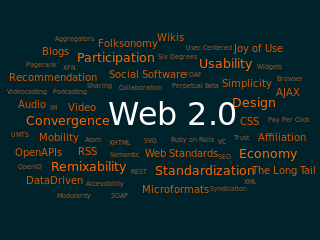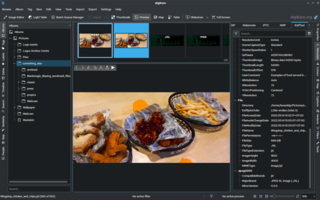Audio Video Interleave is a proprietary multimedia container format and Windows standard introduced by Microsoft in November 1992 as part of its Video for Windows software. AVI files can contain both audio and video data in a file container that allows synchronous audio-with-video playback. Like the DVD video format, AVI files support multiple streaming audio and video, although these features are seldom used.
OpenType is a format for scalable computer fonts. Derived from TrueType, it retains TrueType's basic structure but adds many intricate data structures for describing typographic behavior. OpenType is a registered trademark of Microsoft Corporation.

Exchangeable image file format is a standard that specifies formats for images, sound, and ancillary tags used by digital cameras, scanners and other systems handling image and sound files recorded by digital cameras. The specification uses the following existing encoding formats with the addition of specific metadata tags: JPEG lossy coding for compressed image files, TIFF Rev. 6.0 for uncompressed image files, and RIFF WAV for audio files. It does not support JPEG 2000 or GIF encoded images.

Kontact is a personal information manager and groupware software suite developed by KDE. It supports calendars, contacts, notes, to-do lists, news, and email. It offers a number of inter-changeable graphical UIs all built on top of a common core.
The following tables compare general and technical information for many wiki software packages.

In information systems, a tag is a keyword or term assigned to a piece of information. This kind of metadata helps describe an item and allows it to be found again by browsing or searching. Tags are generally chosen informally and personally by the item's creator or by its viewer, depending on the system, although they may also be chosen from a controlled vocabulary.

TiddlyWiki is a personal wiki and a non-linear notebook for organising and sharing complex information. It is an open-source single page application wiki in the form of a single HTML file that includes CSS, JavaScript, embedded files such as images, and the text content. It is designed to be easy to customize and re-shape depending on application. It facilitates re-use of content by dividing it into small pieces called Tiddlers.
Music Player Daemon (MPD) is a free and open source music player server. It plays audio files, organizes playlists and maintains a music database. In order to interact with it, a client program is needed. The MPD distribution includes mpc, a simple command line client.

digiKam is a free and open-source image organizer and tag editor written in C++ using the KDE Frameworks.
A personal wiki is wiki software that allows individual users to organize information on their desktop or mobile computing devices in a manner similar to community wikis, but without collaborative software or multiple users.

An image organizer or image management application is application software for organising digital images. It is a kind of desktop organizer software application.
NEPOMUK is an open-source software specification that is concerned with the development of a social semantic desktop that enriches and interconnects data from different desktop applications using semantic metadata stored as RDF. Between 2006 and 2008 it was funded by a European Union research project of the same name that grouped together industrial and academic actors to develop various Semantic Desktop technologies.
Tinderbox is a personal content management system and personal knowledge base.

3D Topicscape is a Personal information manager that provides a template loosely based on mind-mapping or concept mapping. It presents the mind map as a 3D scene where each node is a cone. It can also display in a 2D format. Nodes are arranged in a way that indicates how they are related in much the same way as a mind map. In addition to its use for information management it is claimed to be suitable as a task manager, and for use in project management.
Folksonomy is a classification system in which end users apply public tags to online items, typically to make those items easier for themselves or others to find later. Over time, this can give rise to a classification system based on those tags and how often they are applied or searched for, in contrast to a taxonomic classification designed by the owners of the content and specified when it is published. This practice is also known as collaborative tagging, social classification, social indexing, and social tagging. Folksonomy was originally "the result of personal free tagging of information [...] for one's own retrieval", but online sharing and interaction expanded it into collaborative forms. Social tagging is the application of tags in an open online environment where the tags of other users are available to others. Collaborative tagging is tagging performed by a group of users. This type of folksonomy is commonly used in cooperative and collaborative projects such as research, content repositories, and social bookmarking.

Org Mode is a mode for document editing, formatting, and organizing within the free software text editor GNU Emacs and its derivatives, designed for notes, planning, and authoring. The name is used to encompass plain text files that include simple marks to indicate levels of a hierarchy, and an editor with functions that can read the markup and manipulate hierarchy elements.
Microdata is a WHATWG HTML specification used to nest metadata within existing content on web pages. Search engines, web crawlers, and browsers can extract and process Microdata from a web page and use it to provide a richer browsing experience for users. Search engines benefit greatly from direct access to Microdata because it allows them to understand the information on web pages and provide more relevant results to users. Microdata uses a supporting vocabulary to describe an item and name-value pairs to assign values to its properties. Microdata is an attempt to provide a simpler way of annotating HTML elements with machine-readable tags than the similar approaches of using RDFa and microformats.

Zim is a graphical text editor designed to maintain a collection of locally stored wiki-pages, a personal wiki. It works as a personal knowledge base and note-taking software application that operates on text files using markdown. Each wiki-page can contain things like text with simple formatting, links to other pages, attachments, and images. Additional plugins, such as an equation editor and spell-checker, are also available. The wiki-pages are stored in a folder structure in plain text files with wiki formatting. Zim can be used with the Getting Things Done method.

A personal knowledge base (PKB) is an electronic tool used to express, capture, and later retrieve the personal knowledge of an individual. It differs from a traditional database in that it contains subjective material particular to the owner, that others may not agree with nor care about. Importantly, a PKB consists primarily of knowledge, rather than information; in other words, it is not a collection of documents or other sources an individual has encountered, but rather an expression of the distilled knowledge the owner has extracted from those sources or from elsewhere.








